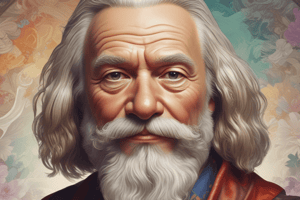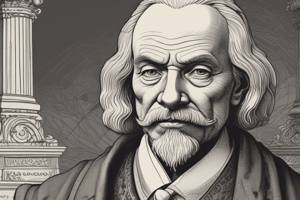Podcast
Questions and Answers
Which statement best reflects the epistemological stance of British Empiricism?
Which statement best reflects the epistemological stance of British Empiricism?
- Sensory evidence is the primary data for all knowledge. (correct)
- Deductive reasoning from first principles provides the most reliable knowledge.
- Innate knowledge is the primary driver of understanding the world.
- Knowledge is solely constructed through social interactions.
According to Thomas Hobbes, what is the role of government?
According to Thomas Hobbes, what is the role of government?
- To control the innate tendencies of aggressiveness, selfishness, and greediness within humans. (correct)
- To facilitate the natural goodness and cooperation within humanity.
- To promote democratic ideals by empowering every individual's voice.
- To ensure individual freedoms above all else.
According to Thomas Hobbes, what drives human behavior?
According to Thomas Hobbes, what drives human behavior?
- Altruism and the desire for social harmony alone.
- Appetite, seeking pleasure, and aversion, avoiding pain. (correct)
- A drive to fulfill one's potential for self-actualization.
- The pursuit of knowledge, entirely.
What assertion did John Locke make?
What assertion did John Locke make?
According to John Locke, what role does reflection play in the formation of ideas?
According to John Locke, what role does reflection play in the formation of ideas?
What is the key distinction between primary and secondary qualities, according to John Locke?
What is the key distinction between primary and secondary qualities, according to John Locke?
What did George Berkeley mean when he stated, "To be is to be perceived?"
What did George Berkeley mean when he stated, "To be is to be perceived?"
According to David Hume, what are the three laws of association?
According to David Hume, what are the three laws of association?
According to David Hume, what determines behavior?
According to David Hume, what determines behavior?
How did David Hartley explain the association of ideas?
How did David Hartley explain the association of ideas?
What is the significance of 'mental chemistry' as proposed by John Stuart Mill?
What is the significance of 'mental chemistry' as proposed by John Stuart Mill?
What was Alexander Bain's approach to psychology?
What was Alexander Bain's approach to psychology?
Which statement aligns with the core tenets of French Sensationalism?
Which statement aligns with the core tenets of French Sensationalism?
What was Pierre Gassendi's philosophical goal?
What was Pierre Gassendi's philosophical goal?
What did Julien do La Mettrie believe?
What did Julien do La Mettrie believe?
What concept is associated with Etienne Bonnot de Condillac?
What concept is associated with Etienne Bonnot de Condillac?
According to Claude Helvetius, what happens when you control experience?
According to Claude Helvetius, what happens when you control experience?
What is scientism?
What is scientism?
According to Auguste Comte, what should be the focus of legitimate knowledge?
According to Auguste Comte, what should be the focus of legitimate knowledge?
What are the three stages in Auguste Comte's law of three stages?
What are the three stages in Auguste Comte's law of three stages?
What was the focus of sociology, according to Auguste Comte?
What was the focus of sociology, according to Auguste Comte?
How did Ernst Mach's positivism differ from Auguste Comte's?
How did Ernst Mach's positivism differ from Auguste Comte's?
What is a key tenet of Empiricism?
What is a key tenet of Empiricism?
Which individual is recognized as the founder of British Empiricism?
Which individual is recognized as the founder of British Empiricism?
John Locke used the concept of tabula rasa to describe:
John Locke used the concept of tabula rasa to describe:
Berkeley's famous statement is:
Berkeley's famous statement is:
Which of the following concepts did David Hume emphasize?
Which of the following concepts did David Hume emphasize?
What did John Stuart Mill call the “science of the formation of character?”
What did John Stuart Mill call the “science of the formation of character?”
What is the core idea behind Positivism?
What is the core idea behind Positivism?
What is the best description of simple versus complex ideas according to Locke
What is the best description of simple versus complex ideas according to Locke
According to David Hume, an understanding of causation is derived from what?
According to David Hume, an understanding of causation is derived from what?
According to Alexander Bain the laws of association are supplemented by the Law of Frequency and have an affect on what?
According to Alexander Bain the laws of association are supplemented by the Law of Frequency and have an affect on what?
What was so important about Auguste Comte's proposed “religion of humanity?”
What was so important about Auguste Comte's proposed “religion of humanity?”
Hobbes, Locke, Berkeley, Hume, Hartley, James Mill and John Stuart Mill would all agree on:
Hobbes, Locke, Berkeley, Hume, Hartley, James Mill and John Stuart Mill would all agree on:
What is the most accurate comparison of Auguste Compte's Three Stages and the trajectory of civilization following the collapse of Rome?
What is the most accurate comparison of Auguste Compte's Three Stages and the trajectory of civilization following the collapse of Rome?
Flashcards
Empiricism
Empiricism
The philosophical view that knowledge comes primarily from sensory experience.
Epistemology
Epistemology
The study of the nature of knowledge, justification, and belief.
Empiricism and Knowledge
Empiricism and Knowledge
Knowledge cannot exist until sensory evidence is gathered.
Thomas Hobbes
Thomas Hobbes
Signup and view all the flashcards
Hobbes on Government
Hobbes on Government
Signup and view all the flashcards
Hobbes: Materialism
Hobbes: Materialism
Signup and view all the flashcards
Locke on Education
Locke on Education
Signup and view all the flashcards
Teachers should be pleasant
Teachers should be pleasant
Signup and view all the flashcards
Locke's Primary Qualities
Locke's Primary Qualities
Signup and view all the flashcards
Locke's Secondary Qualities
Locke's Secondary Qualities
Signup and view all the flashcards
Locke: Faulty Associations
Locke: Faulty Associations
Signup and view all the flashcards
Locke: Safe Associations
Locke: Safe Associations
Signup and view all the flashcards
Berkeley: Associations
Berkeley: Associations
Signup and view all the flashcards
Berkeley's Distance Perception
Berkeley's Distance Perception
Signup and view all the flashcards
David Hume's goal
David Hume's goal
Signup and view all the flashcards
Hume's Impressions
Hume's Impressions
Signup and view all the flashcards
Hume's Ideas
Hume's Ideas
Signup and view all the flashcards
Hume: Simple Ideas
Hume: Simple Ideas
Signup and view all the flashcards
Hume: Complex Ideas
Hume: Complex Ideas
Signup and view all the flashcards
Hume: Definition of "Mind"
Hume: Definition of "Mind"
Signup and view all the flashcards
Hume: Laws of Association
Hume: Laws of Association
Signup and view all the flashcards
Hume: "No Self"
Hume: "No Self"
Signup and view all the flashcards
David Hartley's Goal
David Hartley's Goal
Signup and view all the flashcards
Describe Behavior
Describe Behavior
Signup and view all the flashcards
James Mill's View of Mind
James Mill's View of Mind
Signup and view all the flashcards
John Stuart Mill's Mental Chemistry
John Stuart Mill's Mental Chemistry
Signup and view all the flashcards
Science of Character formation
Science of Character formation
Signup and view all the flashcards
Alexander Bain
Alexander Bain
Signup and view all the flashcards
Bain's Components of Mind
Bain's Components of Mind
Signup and view all the flashcards
Alexander Bain's Psychology
Alexander Bain's Psychology
Signup and view all the flashcards
Law of constructional association
Law of constructional association
Signup and view all the flashcards
Voluntary behavior explained
Voluntary behavior explained
Signup and view all the flashcards
French Sensationalism
French Sensationalism
Signup and view all the flashcards
Pierre Gassendi's goal
Pierre Gassendi's goal
Signup and view all the flashcards
Julien do La Mettrie core beliefs
Julien do La Mettrie core beliefs
Signup and view all the flashcards
La Mettrie on Intelligence
La Mettrie on Intelligence
Signup and view all the flashcards
Powers with Locke's mind
Powers with Locke's mind
Signup and view all the flashcards
Social and moral
Social and moral
Signup and view all the flashcards
Scientism
Scientism
Signup and view all the flashcards
Public Observation
Public Observation
Signup and view all the flashcards
Study Notes
British Empiricism
- Epistemology believes sensory evidence is the main source of knowledge
- Knowledge only exists once this evidence is obtained
- Intellectual processes use only this evidence to form credible ideas regarding the real world
Thomas Hobbs
- Hobbs founded British empiricism
- Humans are machines within a larger machine
- Matter and motion explain the universe, based on Galileo's view
- He used Galileo and Descartes' deductive approach
- The goal was to use Galileo's methods to understand humans
- Government control is vital to manage aggressive, selfish, and greedy tendencies
- Democracy can be dangerous due to excessive freedom
- Hobbs thought the "mind" as physical motions within a person, a concept known as physical monism
- Attention describes sense organs retaining motion caused by external objects
- Imagination describes fading sense impressions over time
- Motivation comes from seeking pleasure and avoiding pain, using hedonistic theory
- There is no free will, which constitutes a deterministic view
- Complex thoughts derive from the law of contiguity, originating with Aristotle
- Hobbs was a materialist, mechanist, determinist, empiricist, and hedonist
John Locke
- All ideas stem from sensory experiences
- No innate ideas exist, contrary to Descartes' proposition
- Ideas are mental images during thinking and originate from sensation or reflection
- Sensation is the source of all ideas
- These ideas transform through mental operations into new ideas
- Mind operations, like perception, thinking, doubting, believing, reasoning, knowing, and willing are innate
- Simple ideas described as indivisible, pure, and uncomplicated ideas entering the mind
- Complex ideas are simple ideas combined, and are able to be analyzed back into simple ideas
- Complex ideas form by applying operations to simple ideas via reflection
- Other emotions stem from the basic feelings of pleasure and pain
- Primary qualities create ideas corresponding to real physical attributes
- Qualities like solidarity, extension, shape, motion, and quantity
- Secondary qualities produce ideas not corresponding to objects in the real world
- Qualities like color, sound, temperature, and taste
- Association explains faulty beliefs learned by chance, custom, or mistake
- Many ideas are connected in the mind through logical associations
- Safe associations are naturally-related and represent true knowledge
- Children's education involves increasing stress tolerance and providing necessities
- Learning experiences should be enjoyable with praise for accomplishments
- Locke challenged the divine rights of kings and proposed a government by and for the people
George Berkeley
- Berkeley opposed materialism, citing there was no room for God
- "To be is to be perceived" suggests existence requires being perceived
- Only secondary qualities exist because they are perceived
- Sensations consistently together become associated through contiguity
- Distance perception needs multiple senses, such as viewing and walking toward an object
David Hume
- Hume sought to merge empirical philosophy and Newtonian science for a science of human nature
- He focused on Bacon's inductive method and careful generalization
- Mental contents come from experience, via external or internal events
- Hume distinguished between impressions -- strong, vivid perceptions -- and ideas
- Ideas characterized as weak perceptions and faint images
- Simple ideas are indivisible, aligning with Locke
- Complex ideas are made of other ideas
- Imagination rearranges existing ideas in infinite ways
- Hume identified the three laws of association
- Laws of resemblance, contiguity, and cause and effect
- Causation is a psychological experience, not an objective fact
- The mind is only the sum of current perceptions
- No independent self exists apart from perceptions
- All humans share the same emotions and passions
- Individuals differ in the intensity of their emotions
- Behavior determined by emotions, causing varied responses to situations
- Animals and humans learn through rewards and punishments
David Hartley
- Hartley aimed to combine Newton's nerve transmission concept and vibrations in nerves with empiricism
- He said ideas are weaker sensations and small vibrations (vibratiuncles)
- These can associate through contiguity, whether successive or simultaneous
- Simple ideas form complex ideas through contiguity
- Complex ideas further combine into "decomplex" ideas
- Association laws explain how voluntary behavior develops from involuntary behavior
- Excessive nerve vibration causes pain, while mild vibration causes pleasure
- Involuntary behavior occurs first, then becomes voluntary
- Objects, events, and people link to pleasure or pain, shaping behavior
James Mills
- The mind comprises sensations and ideas linked by contiguity
- Complex ideas are constructed from simple ideas
- Continuous co-experience strengthens associations, merging ideas into one
- Association strength depends on vividness and frequency
John Stuart Mill
- Mill proposed mental chemistry, where ideas fuse into new concepts
- The new concepts are different from original elements
- Science of human nature contains primary and secondary laws
- Mill advocated for "ethology", to study character formation
- Ethology studies how individual minds form under specific conditions
- Mill was a social reformer, supporting free speech, representative government, and women's rights
Alexander Bain
- Bain is often called the first full-fledged psychologist
- Goal was to find physiological connections between mental and behavioral events
- The mind includes feelings, volition (choosing), and intellect
- Intellect relies on association laws, especially contiguity for sensations, ideas, and actions
- Contiguity is strengthened by frequency
- The laws affect neural changes
- Two other laws of association exist
- Compound association means ideas link to others through contiguity or similarity
- Constructive association says the mind rearranges experiences into novel combinations, enabling creativity
- Voluntary behavior begins with random activity responding to a need
- Favorable movements satisfying the need are remembered
- Activities successful previously will be repeated in similar situations, essentially Skinner's behavior selection
French Sensationalism
- The French sensationalists followed British empiricists
- They aimed to be Newtonians of the mind
- Emphasizing the mind's mechanical nature
- The belief was the mind follows simple principles
Pierre Gassendi
- Gassendi sought to replace Descartes's dualistic philosophy
- The replacement would be observational inductive science rooted in physical monism
- “I move, therefore I am” statement
- There was no need to believe in an immaterial mind
Julien do La Mettrie
- Mettrie was a strict materialist
- The universe consists of matter and motion
- Thoughts and sensations are particle movements in the brain
- Humans are machines
- Humans and animals only vary in degree of intelligence
- Intelligence depends on brain size, complexity, and education
- Humans typically have more complex brains and improved education so they are more intelligent than animals
Etienne Bonnot de Condillac
- Condillac believed functions Locke attributed to the mind are from sensation, memory, and feeling
- He illustrated it with a sentinet statue
Claude Helvetius
- Helvetius looked at what empiricism and sensationalism mean
- He controlled the experience to control the person's mind
- Said social skills, moral behavior, and genius could be taught by controlling experience
- Empiricism shifted towards radical environmentalism
Positivism
- Positivism says science is the only valid form of knowledge
- Therefore, science takes on traits of religion
Auguste Comte
- Comte said we can only be sure of what can be publicly observed
- Positivism equates knowledge with empirical observation
- Comte suggested the law of three stages
- Societies explain natural events by stages
- First stage: theological, based on superstition and mysticism
- Second stage: metaphysical, based on unseen essences, principles, causes, and laws
- Third stage: scientific, description, prediction, and control of natural phenomena
- Sociology compares societies' three stages of development
- Proposed a utopian "religion of humanity" based on science, replacing God
- Proposed a science hierarchy: mathematics → astronomy → physics → chemistry → physiological biology → sociology
Ernst Mach
- Mach proposed a unique approach of positivism
- It differed from Comte's positivism
- Positivism differed primarily in what type of data science could be certain about
- Mach thought we never directly experience the physical world
- Insisted on defining concepts by measurement procedures, not "ultimate reality"
- He was anticipating operational definitions
Studying That Suits You
Use AI to generate personalized quizzes and flashcards to suit your learning preferences.




